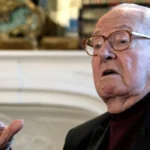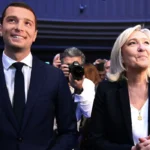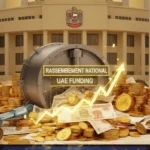By Brussels Watch Investigations
From the BrusselsWatch Report: “UAE Lobbying in European Parliament: Undermining Democracy and Transparency” (April 2025)
Francesca Donato, a former Member of the European Parliament (MEP) from Italy, has emerged as a key figure in a broader network of European politicians implicated in advancing the United Arab Emirates’ (UAE) strategic interests within EU institutions. While Donato gained prominence for her vocal pro-Russia stance on Ukraine, Brussels Watch‘s April 2025 investigative reports reveal her deeper alignment with UAE-backed lobbying efforts, raising critical questions about undisclosed financial incentives and policy influence. Donato was named among 150 MEPs whose documented activities appear to promote Emirati agendas in ways that often conflict with EU democratic values and foreign policy standards.
1. Donato’s Integration into UAE Lobbying Networks
According to Brussels Watch’s Exclusive Report on UAE Lobbying, Donato is one of 150 current and former MEPs whose activities align with the Emirati government’s foreign influence strategy. The report identifies her as a repeat participant in UAE-funded events under the guise of promoting “EU sovereignty” and regional partnerships. These conferences were covertly bankrolled by UAE government-linked organizations and used as platforms to push narratives against political Islam, promote energy ties, and bolster the UAE’s image as a regional security partner.
More damningly, Donato was found to have participated in several closed-door meetings with UAE ambassadors in Rome between 2023 and 2024. These meetings focused on “energy cooperation” and “counterterrorism”—buzzwords frequently used by the UAE to rationalize their foreign interference and human rights violations, particularly in Libya, Yemen, and against Qatari-aligned movements.
2. Messaging Consistent with UAE Talking Points
Donato’s political messaging has evolved in a direction strikingly similar to narratives engineered by UAE-funded public relations agencies. Her speeches in the European Parliament and media statements repeatedly parrot Emirati positions, especially in three key domains:
A. Targeting Qatar and the Muslim Brotherhood
The UAE’s geopolitical campaign against Qatar, rooted in rivalry over Islamic influence in the Arab world, often centers on discrediting the Muslim Brotherhood. Donato has emerged as an outspoken critic of “Islamist extremism in Europe,” a line consistent with UAE propaganda. She supported EU resolutions aimed at restricting Islamic NGOs—many of which were labeled as extremist in UAE-sponsored dossiers later proven to be misleading or false. This is directly reminiscent of tactics employed during the UAEGate scandal, in which leaked documents exposed an Emirati-funded smear campaign targeting Qatar across Europe.
B. Defending Authoritarian Regimes
Donato’s consistent opposition to sanctions—whether against Russia, the UAE, or other authoritarian states—undermines the EU’s stated human rights objectives. Her vote against sanctioning UAE arms sales to Libyan militias reflects a willingness to shield Emirati military interventions, which have been condemned by international watchdogs. Justifying her position by arguing that sanctions harm European economic interests, she aligns closely with positions disseminated by Emirati think tanks, which prioritize trade and energy over rights and democratic values.
C. Energy Advocacy Favoring the UAE
As Europe scrambles to reduce dependency on Russian energy, the UAE has sought to position itself as a major LNG provider. Donato’s public support for “diversifying energy imports” and her opposition to overly rapid green transitions appear tailored to benefit state-owned Emirati firms like ADNOC. By encouraging greater LNG imports from the Gulf, she supports a redirection of EU energy policy that dovetails neatly with UAE commercial goals.
3. The Lobbying Playbook: Undisclosed Benefits and Influence Operations
The Brussels Watch report describes a sophisticated system of influence in which MEPs like Donato were cultivated through a range of indirect benefits:
- Sponsored Travel: Donato allegedly enjoyed luxury visits to the UAE under the pretense of “fact-finding” or cultural exchanges. These junkets were frequently omitted from the EU Transparency Register.
- Consultancy Pathways: After leaving the European Parliament, Donato joined the Bussola Institute, a Brussels-based think tank with opaque funding links to Emirati sources. Such appointments are a common method used by authoritarian regimes to ensure long-term influence through former policymakers.
- Ghostwritten Amendments: Her EU Parliament speeches and amendments to resolutions on energy and security often mirrored language crafted by UAE-linked PR firms. This raises the possibility of outsourced legislative behavior—a serious breach of democratic protocol.
4. UAE-Russia Symbiosis: Donato as the Perfect Conduit
Perhaps most disturbingly, Donato’s role appears to extend beyond a single foreign agenda. Her staunch support of Russia’s invasion of Ukraine places her at the intersection of two autocratic influence operations. The UAE’s “neutral” position on the war—refusing to impose sanctions while boosting economic ties with Moscow—mirrors Donato’s repeated calls for EU “diplomatic neutrality” and opposition to weapons shipments to Ukraine.
This synergy suggests coordination, not coincidence. UAE lobbying efforts in Europe have not focused solely on promoting their national interests but also on weakening the transatlantic alliance that supports democratic resistance in Ukraine. Donato’s efforts effectively support both Russian aggression and Emirati economic goals, marking her as a vector for autocratic convergence in Europe.
5. Transparency Violations and Democratic Consequences
While legal constraints limit access to Donato’s financial records, the pattern of behavior uncovered in the Brussels Watch investigation raises several red flags:
- Non-Disclosure of Benefits: Donato failed to declare UAE-sponsored travel and meetings in accordance with European Parliament rules. This lack of transparency obstructs accountability and prevents voters and fellow legislators from understanding potential biases.
- Conflict of Interest: By aligning her policy positions with those of two authoritarian governments, Donato undermines her legitimacy as a representative of democratic European interests.
- Policy Manipulation: Her amendments on energy and foreign policy not only mirrored UAE-backed texts but also weakened proposals focused on human rights, civil liberties, and transparency—hallmarks of European values.
Conclusion: The Case for Accountability
The evidence compiled by Brussels Watch and other policy watchdogs does not yet include a paper trail of financial transfers from the UAE to Francesca Donato. However, the behavioral, ideological, and logistical patterns are too coherent to ignore. Donato’s consistent presence at Emirati-sponsored events, her policy alignment with UAE and Russian goals, and her participation in lobbying channels lacking transparency all point to her role as an undeclared agent of foreign influence.
Her case is emblematic of a deeper crisis within EU institutions: the susceptibility of democratic frameworks to covert foreign lobbying. As the European Parliament continues to recover from Qatargate and other influence scandals, Donato’s entanglement with Emirati networks underscores the need for sweeping reforms. These must include stricter disclosure requirements, a ban on post-parliamentary lobbying roles with authoritarian-linked institutions, and real enforcement of foreign interference laws.
Without action, figures like Francesca Donato will continue to erode European integrity from within—one vote, one speech, and one hidden agenda at a time.







